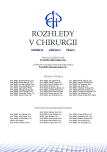-
Medical journals
- Career
Fluid therapy and surgical outcomes after low anterior resection
Authors: P. Kocian; J. Neumann; P. Majtan; J. Hoch
Authors‘ workplace: Chirurgická klinika 2. LF UK a FN Motol, přednosta: prof. MUDr. J. Hoch, CSc.
Published in: Rozhl. Chir., 2014, roč. 93, č. 9, s. 463-467.
Category: Original articles
Overview
Introduction:
Fluid therapy is a fundamental component of surgical care. Recent data regarding fluid restriction has shown an association with improved outcomes. The aim of this study is to determine whether the use of restrictive approaches in perioperative fluid administration improves patient outcomes following low anterior resection.Material and methods:
89 patients undergoing low anterior resection included in this study were divided by the median 14.9 mL/kg/h into group A (7.4–14.7 mL/kg/h) and group B (14.9–36.8 mL/kg/h) within intraoperative fluid administration, and by the median 3.3 mL/kg/h into group C (2.0–3.3 mL/kg/h) and group D (3.3–6.9 mL/kg/h) for fluid administration on the day of surgery. The main outcomes measured were cardiac and pulmonary complications, the incidence of anastomotic leak and wound infections, gastrointestinal function recovery, laboratory inflammatory markers and the length of hospital stay.Results:
The restricted perioperative fluid regimen significantly reduced the risk of pleural effusion and anastomotic leak in patients after low anterior resection. The overall incidence of anastomotic leak was 9.0%. Another significant risk factor for anastomotic leak was neoadjuvant radiochemotherapy (15.9% vs. 2.2%, p=0.03).Conclusion:
The restricted perioperative fluid regimen reduces postoperative morbidity in patients after low anterior resection. Hospital stay remains unchanged.Key words:
fluid therapy − perioperative management − fluid restriction − low anterior resection − anastomotic leak
Sources
1. Brandstrup B. Fluid therapy for the surgical patient. Best Pract Res Clin Anaesthesiol 2006;20 : 265−83.
2. Doherty M, Buggy DJ. Intraoperative fluids: how much is too much? Br J Anaesth 2012;109 : 69−79.
3. Jacob M, Chappell D, Rehm M. The ‘third space‘ – fact or fiction? Best Pract Res Clin Anaesthesiol 2009;23 : 145−57.
4. Lowell JA, et al. Postoperative fluid overload: not a benign problem. Crit Care Med 1990;18 : 728−33.
5. Bouchard J, Mehta RL. Fluid balance issues in the critically ill patient. Contrib Nephrol 2010;164 : 69−78.
6. Simmons RS, et al. Fluid balance and the adult respiratory distress syndrome. Am Rev Respir Dis 1987;135 : 924−9.
7. Holte K, Kehlet H. Fluid therapy and surgical outcomes in elective surgery: a need for reassessment in fast-track surgery. J Am Coll Surg 2006;202 : 971−89.
8. Brandstrup B, et al. Effects of intravenous fluid restriction on postoperative complications: comparison of two perioperative fluid regimens: a randomized assessor-blinded multicenter trial. Ann Surg 2003;238 : 641−8.
9. Nisanevich V, et al. Effect of intraoperative fluid management on outcome after intraabdominal surgery. Anesthesiology 2005;103 : 25−32.
10. Lobo DN, et al. Effect of salt and water balance on recovery of gastrointestinal function after elective colonic resection: a randomised controlled trial. Lancet 2002;359 : 1812−8.
11. Holte K, et al. Liberal or restrictive fluid administration in fast-track colonic surgery: a randomized, double-blind study. Br J Anaesth 2007;99 : 500−8.
12. Bleier JI, Aarons CB. Perioperative Fluid Restriction. Clin Colon Rectal Surg 2013;26 : 197−202.
13. Rahbari NN, et al. Meta-analysis of standard, restrictive and supplemental fluid administration in colorectal surgery. Br J Surg 2009;96 : 331−41.
14. Campbell IT, et al. IV fluids during surgery. Br J Anaesth 1990;65 : 726−9.
15. Cvachovec K. Volumová terapie. ZDN. Příl. Lék. listy 2010;21 : 16−18.
16. Cvachovec K. Problematika tekutinové resuscitace – koloidy a krystaloidy. ZDN. Příl. Lék. listy 2010;12 : 5−8.
17. Matthiessen P, et al. Risk factors for anastomotic leakage after anterior resection of the rectum. Colorectal Dis 2004;6 : 462−9.
18. Schiffmann L, et al. Intensified neoadjuvant radiochemotherapy for rectal cancer enhances surgical complications. BMC Surg 2013;13 : 43.
19. Vermeer TA, et al. Anastomotic leakage and presacral abscess formation after locally advanced rectal cancer surgery: Incidence, risk factors and treatment. Eur J Surg Oncol 2014.
Labels
Surgery Orthopaedics Trauma surgery
Article was published inPerspectives in Surgery

2014 Issue 9-
All articles in this issue
- The role of drains in pancreatic surgery
- Personalised antibiotic therapy in a surgical intensive care unit − overview of current knowledge and the results of an observational kinetic study M. Kaska, J. Martinkova, E. Havel, J. Koci, A. Fouskova, D. Solichova, L. Kujovska, I. Selke-Krulichova, I. Praznovec, V. Salavec
- Fluid therapy and surgical outcomes after low anterior resection
- Chylous mesenteric cyst
- Lymphangioma of the retroperitoneum treated laparoscopically J. Skach, M. Chrenko, P. Hromadka
- Limits of surgery for pancreatic cancer
- Severe hidradenitis suppurativa
- Perspectives in Surgery
- Journal archive
- Current issue
- Online only
- About the journal
Most read in this issue- Chylous mesenteric cyst
- Lymphangioma of the retroperitoneum treated laparoscopically J. Skach, M. Chrenko, P. Hromadka
- The role of drains in pancreatic surgery
- Fluid therapy and surgical outcomes after low anterior resection
Login#ADS_BOTTOM_SCRIPTS#Forgotten passwordEnter the email address that you registered with. We will send you instructions on how to set a new password.
- Career

